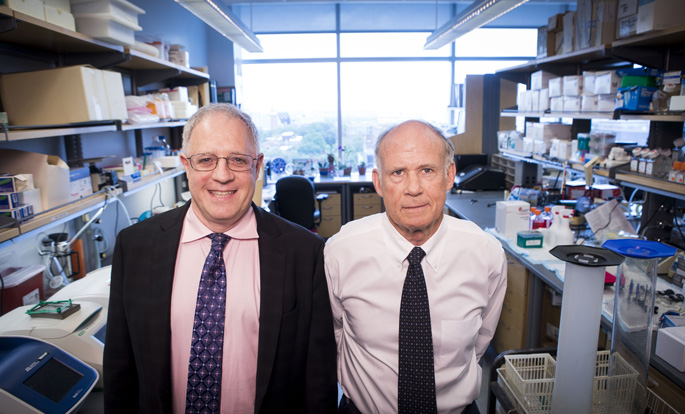
Colorectal cancer researchers from Vanderbilt-Ingram Cancer Center (VICC) have been awarded a Specialized Program of Research Excellence grant from the National Cancer Institute (NCI).
The Gastrointestinal SPORE grant is for a five-year period totaling $11.6 million. The researchers, led by principal investigator Robert Coffey, MD, have succeeded in securing continuous SPORE funding since an initial grant in 2002. The original SPORE program was renewed two times then received bridge funding in 2017.
Competition for SPORE funding is highly competitive. Including Vanderbilt, there are currently just four medical research centers in the nation with NCI-funded SPOREs in gastrointestinal cancer.
“Despite the need for each project to reach a translational goal in five years, we pride ourselves on taking on high-risk, high-reward projects,” said Coffey, Ingram Professor of Cancer Research and director of the Epithelial Biology Center at Vanderbilt University Medical Center.
Those projects include developing an inhibitor for a cancer oncogene currently considered undruggable, identifying how to target cancer stem cells and devising a companion drug to improve the efficacy of and delay resistance to existing targeted therapies.
“The program is based on teamwork,” said Jordan Berlin, Ingram Professor of Cancer Research, VICC associate director for Clinical Research and co-director of the administrative core for the GI SPORE.
“One of the nice things about Vanderbilt in general and the GI oncology program is the ease with which everyone works together,” Berlin said. “It took a team to put this together. The ongoing collaborative nature of our team affords the best chance to lead to translational breakthroughs.”
VICC researchers have succeeded in securing two SPORE grants in this new round of NCI funding: the GI SPORE and another $11.6 million Breast SPORE.
“At Vanderbilt we are committed to developing new and better treatments for cancer patients. The awarding of two NCI-designated SPORE programs is recognition that we are at the forefront of discovery and innovation in cancer research,” said Jennifer Pietenpol, PhD, B.F. Byrd Jr. Professor of Oncology, holder of the Brock Family Directorship in Career Development, Executive Vice President for Research at VUMC and director of VICC.
The colorectal cancer program within the GI SPORE has three projects: developing a drug to inhibit the MYC oncogene, examining whether cancer stem cells represent a tractable therapeutic target and improving the efficacy of EFGR inhibitors by targeting glutamine metabolism.
Berlin explained what some of those research goals mean for colorectal cancer patients.
“We are trying to make it so that the drugs that are available can be used most effectively and keep people alive longer,” Berlin said. “Also, there’s a large group of patients whose tumors are surgically removed, they are treated post-surgically with chemotherapy and seem to be cancer free and then the cancer recurs. For those patients, especially years later, it’s likely due to the emergence of dormant cancer stem cells that were resistant to the therapy.”
Project details and investigators:
- Interrogating Distinct Tumor-Initiating Cells in Colorectal Cancer Researchers will monitor and inhibit colorectal stem cells, also known as tumor-initiating cells. A focus of the investigation centers around the role of LRIG1 and LGR5 in this process. Investigators on the project include Coffey and Ken Lau, PhD, associate professor of Cell and Developmental Biology.
- Targeting Glutamine Metabolism to Enhance EGFR Blockade in Wild-Type RAS Colorectal Cancer Researchers will work to prolong the efficacy of EGFR inhibitors, including cetuximab and panitumumab, because patients develop resistance to the targeted therapies. Lab studies at Vanderbilt have shown that cancer cells become re-sensitized to EGFR inhibitors when an energy source of cell-division, glutamate, is blocked. A drug developed at Vanderbilt inhibits ACST2, a protein that is the primary transporter of glutamine, which is converted into glutamate. Investigators on the project include Berlin, Charles Manning, PhD, Ingram Professor of Cancer Research, and Kristen Ciombor, MD, MSCI, assistant professor of Medicine.
- Targeting MYC in Colorectal Cancer The MYC oncogene is thought to be a driving force in up to 70% of human cancers, including colon cancer. Researchers are focused on developing a drug to inhibit MYC, which is currently thought to be undruggable. Investigators on the project include Daniel Beauchamp, MD, the John Clinton Foshee Distinguished Professor of Surgery and Professor of Cancer Biology and Cell and Developmental Biology; Stephen Fesik, PhD, Orrin H. Ingram II Professor of Cancer Research, and William Tansey, PhD, Ingram Professor of Cancer Research and professor of Cell and Developmental Biology.




